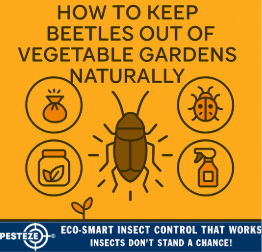HOW TO KEEP BEETLES OUT OF VEGETABLE GARDENS NATURALLY

HOW TO KEEP BEETLES OUT OF VEGETABLE GARDENS NATURALLY
SUMMARY
Beetles can quickly damage vegetable gardens by feeding on leaves, stems, and crops. Common pests like cucumber beetles, Japanese beetles, and flea beetles can reduce yields if left unchecked. With natural repellents, garden maintenance, and strategic planting, you can protect your vegetables and maintain a healthy, thriving garden.
FEATURES
-
Handpick Beetles – Remove visible beetles early in the morning when they are sluggish.
-
Use Row Covers – Protect plants with breathable covers to block beetles.
-
Plant Companion Crops – Marigolds, garlic, and catnip deter beetles naturally.
-
Apply Natural Repellents – Neem oil and diatomaceous earth discourage beetle infestations.
-
Maintain Healthy Soil – Strong plants resist beetle damage better.
-
Encourage Natural Predators – Birds, frogs, and beneficial insects feed on beetles.
GUIDE DESCRIPTION
Beetles are among the most persistent pests in vegetable gardens, with different species targeting specific crops. For example, cucumber beetles attack squash and cucumbers, while Japanese beetles feed on beans, corn, and tomatoes. Preventing infestations requires a combination of natural strategies and consistent garden care.
One of the simplest methods is handpicking beetles. Early mornings, when beetles are less active, are the best times to collect them and drop them into a container of soapy water for disposal.
Row covers provide a physical barrier between beetles and your crops. Lightweight and breathable, they allow sunlight and rain through while keeping pests out. Row covers are especially useful during the early growing season when plants are most vulnerable.
Companion planting is another powerful natural defense. Plants like marigolds, garlic, onions, and catnip produce scents that beetles dislike, helping deter them from your vegetable beds. These companion crops also enhance garden biodiversity.
Natural repellents such as neem oil sprays can disrupt beetle feeding and reproduction. Similarly, diatomaceous earth, a fine powder made of fossilized algae, can be sprinkled around plants. It’s safe for humans and pets but abrasive to beetles, making your garden less inviting.
Healthy plants are naturally more resistant to beetle damage. Maintaining nutrient-rich soil through composting, crop rotation, and mulching ensures strong plant growth that can withstand minor pest activity.
Finally, encouraging natural predators helps keep beetle populations under control. Birds, frogs, and beneficial insects like ladybugs and parasitic wasps feed on beetles or their larvae. Providing birdbaths, native flowers, and insect-friendly habitats can increase predator presence.
By combining handpicking, row covers, companion planting, repellents, soil care, and predator support, you can effectively keep beetles out of vegetable gardens. These eco-friendly methods ensure your crops grow healthy, vibrant, and protected throughout the season.
- Shashank Rongali


Comments 0